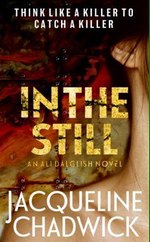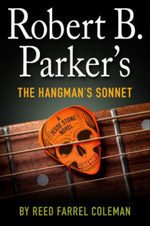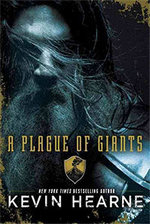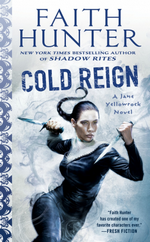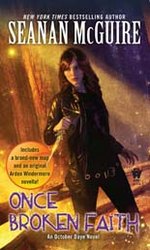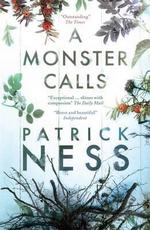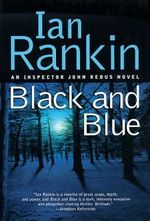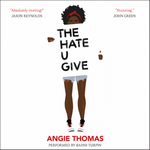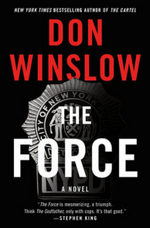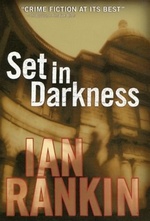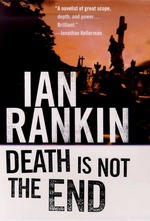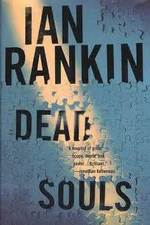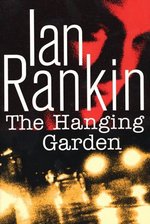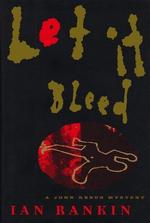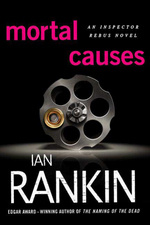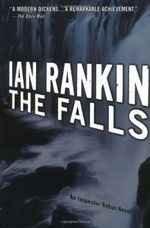 The Falls
The Falls
by Ian Rankin
Series: John Rebus, #12
Hardcover, 395 pg.
Minotaur Books, 2001
Read: January 15 – 16, 2018

If anyone can do it, John, you can. I’ve always had confidence in your sheer pig-headedness and inability to listen to your senior officers.
After the last few novels which were characterized by several interlocking stories, The Falls centers on the disappearance of a young woman — Philippa Balfour. Flip is the daughter of an important banker, a student of sorts, and frequently the girlfriend of one of the least appealing young men you’ve met lately. She never showed up for a night of drinking with friends and her father’s influence got the police involved much more quickly than they would have otherwise. There are few that hold out much hope for a happy resolution to this case, but until a body shows up, that’s how they have to proceed.
Now, just because I said there’s only one case at the core of this book, that doesn’t mean it’s just one story. There’s the typical investigation, undertaken by a large number of detectives and under media scrutiny. Then there’s something that catches Rebus’ eye, which leads him on one path. Siobhan Clarke finds another loose strand to pull at, and uses much of her off-the-clock time following that. The two are aware of what the other is doing, but neither is all that interested in it. Readers, of course, know that one or both of them are going to make more progress than the rest of the Force and can just enjoy watching them.
That’s the strength of this book — Rebus finds some evidence that might tie this crime to others throughout Scotland over the past few decades. He clearly specializes in historical investigations, and it’s clearly a good idea for him to go down that path. Siobhan’s got a more tech-savvy take on it (and she doesn’t have all the skills necessary for that kind of work, but she’s able to stumble along with some help. Watching both of these two mavericks at work was such a blast (Siobhan once again is confronted with her colleagues pointing out her methods and focus approximating Rebus’). The actual solution to the mystery of Flip’s appearance was very satisfying and well-executed.
I spent a good deal of time missing Brian Holmes during the early pages — the DS that Siobhan is partnered up with just stressed how much isn’t Brian. And it goes downhill from there. Brian might not have been my favorite supporting character, but wow — he’s so much better than everyone else Siobhan has worked with (other than DI Rebus, of course). Maybe it helps that he was involved with that librarian, so he wasn’t trying to start something with her (minor spoiler, sorry).
The book starts with Watson’s retirement (not the last we see of him, which is nice), and newly-minted DCS Gill Templar has her work cut out for her. Not only does she need to lead the search for the missing daughter of an important Edinburgh banker, but she has to establish her authority. The way she goes about it rubs some the wrong way, and you have to wonder how long she can maintain things. Siobhan’s take on her new boss shows a good amount of discernment. One thing’s for sure, Rebus is going to miss Farmer Watson (but not his coffee).
Speaking of Gill, Rebus has a new romantic interest in The Falls, Jean Burchill. I liked Jean more than I ever liked Gill, Patience (low bar, there) or any of the others that have graced these pages. Her husband had been an alcoholic (of a different sort than Rebus), and sees Rebus’ vices in a very different light than other have. She doesn’t approve, but she can approach them more realistically than Patience ever did. I fear she won’t be around long, but that’s hopefully just cynicism on my part. (feel free to leave me in the dark on that front down in the comment box, folks).
Not just Farmer’s retirement, but Rebus has to deal with loss and a greater sense of mortality at points here. He and his contemporaries can’t help but sense their own retirement days approaching/looming. Also, Rebus may not add to his enemies list within the Police, but he’s deepened the antagonism a few have toward him. At one point, he goes out of his way to cultivate that — for a good reason, in his mind at least. But I’m not sure if he’s ever come closer to losing his job. Who knows what’d happen to him if that day comes.
This is one of those covers that makes you wish cover designers had to read the book — an inconsequential point, but when Rebus actually got to the titular location, I had to shake my head. (Other cover images I’ve seen for this aren’t as misleading).
This might not be as powerfully told, or as sweeping as some of the recent books have been. But I’m not sure I’ve enjoyed reading a Rebus novel more than this one — and could’ve easily read it in one sitting. This will be sure to please Rebus fans and could easily make some, too.
—–




